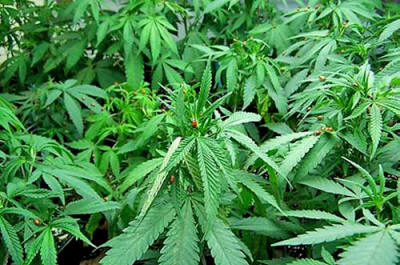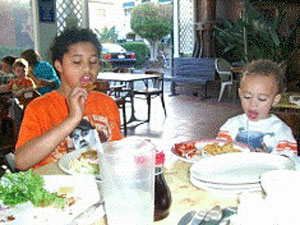|
19 August 2010
Cannabis can realize its full
therapeutic potential
Many physicians, even in California, refrain from approving use of cannabis by patients out of residual fear.
Countless others refrain because they
learned nothing about cannabis in medical school and cannot
knowledgeably advise patients about dosage, side effects, or
mechanism of action. This is of course not an acceptable situation,
especially in pediatric care, because it is so useful and safe and
potentially lifesaving in certain cases.
The United States government enjoys its cruelty as has been demonstrated by its “war against drugs.”
Marijuana is brimming with healing compounds and doctors 100 years ago understood this simple fact; that was the reason pharmacies always made it available to the public.
Iodine and marijuana were principle medicines used in the 19th and very early part of the 20th century.
Both were forced from the consciousness of modern physicians who became mentally enslaved to pharmaceutical interests that got doctors more interested in money and poisoning than in helping patients with safe and effective medicines.
Cannabinoids are usually well tolerated,
and do not produce
Marijuana is an extremely broad acting and universally useful medicine with appropriate application for most disease conditions.
Crohn’s disease patients credit the plant with helping reverse their debilitating intestinal disorders, and accredited research suggests its use in dealing with and preventing,
Tetrahydrocannabinol (THC) and
natural cannabinoids counteract
cancer and chemical
toxicity from drugs and
environmental sources thus helping to preserve normal cells.
We are talking about serious medicine and the pharmaceutical companies know this and are making synthetic versions of THC, but synthetic copies cannot compete with the real thing in terms of safety and effectiveness.
The potpourri of prescription medications he’d consumed since the age of five had damaged his body beyond repair - the side effects were literally killing him. Joey was diagnosed with autism at 18 months old. At one point, he was taking six different medications - up to three times a day. As a result of the side effects, Joey became malnourished and was diagnosed with anorexia.
Every day, his condition got worse. His eyes were sunken in and you could easily see all the bones in his chest.
He was refusing to eat.
At the end of his allopathic treatments his medical prognosis was high probability of death within six months.
Today Joey is thriving and his mother has been on The Good Morning Show to share that the Compassionate Use of Medical Marijuana saved her son’s life.
12 Months After
Marijuana Treatments
Today at age 11, Joey is flourishing with new communicative expressions, he’s gained over 40 lbs, and he’s happier, healthier, better behaved and is more productively active than ever before.
Before we began to give him treatments of oral marijuana he was a danger to himself and others. He had suffered from anxiety, OCD, and aggression since an early age. At the age of five, Joey was prescribed the first of many ineffective, harmful medications.
The medications he was prescribed at that time worked for about a year but Joey refused to eat and that was the beginning of their story. As a result of the serious side effects, Joey became malnourished and was diagnosed with anorexia.
It was the famous marijuana brownies that saved my son’s life and it was the doctors and their pharmaceutical medicines that almost killed him.
Marijuana, the forbidden medicine, seems to be useful for some people with adult attention deficit disorder, impulse disorders and bipolar disorder.
Some families have found marijuana to be nothing short of miraculous. Some of the symptoms marijuana has ameliorated include anxiety - even severe anxiety - aggression, panic disorder, generalized rage, tantrums, property destruction and self-injurious behavior.
One mother commenting on using marijuana for her autistic child said,
Patients report medical marijuana
Dr. Rimland continues saying,
He continues,
Recently, researcher Dr. Ester Fride of the Behavioral Sciences Department of Israel’s College of Judea and Samaria published a pair of scientific papers stating that the brain’s cannabinoid receptors (receptors in the brain that respond pharmacologically to various compounds in cannabis as well as other endogenous compounds) and the naturally occurring messenger molecules that activate and bind to them (so-called endocannabinoids),
Writing in Neuroendocrinology Letters and the European Journal of Pharmacology, Fride suggests,
She notes that in animals, the endogenous cannabinoid system fulfills several important developmental functions, including:
A dysfunctional endocannabinoid system, Fride speculates, may be responsible for certain abnormalities in infants, particularly “failure-to-thrive” syndrome, a condition in which newborns fail to properly grow and gain weight.
(In animal studies, mice fail to gain
weight and die within the first week of life when their cannabinoid
receptors are blocked.)
She notes that “excellent clinical results” have been
reported in pediatric oncology and in case studies of children with
severe neurological diseases or brain trauma, and suggests that
cannabis-derived medicines could also play a role in the treatment
of other childhood syndromes, including the pain and
gastrointestinal inflammation associated with cystic fibrosis.
The news is a huge embarrassment for
the Department of Health in England, which has unjustly crucified
Dr. Wakefield’s research.
Marijuana cuts lung cancer tumor growth
in half, a 2007 The active ingredient in marijuana
cuts tumor growth in common lung cancer in half
Because the development of the cannabinoid receptor system appears to occur gradually over the course of childhood,
She concludes,
Nausea appetite loss, pain and anxiety
are all afflictions
In test-tube experiments, researchers at the National Institutes of Health (NIH) in Bethesda, Md. exposed rat nerve cells to a toxin that is typically released during strokes.
Cannabidiol reduces the extent of damage researchers reported to the National Academy of Sciences.
More effective than vitamins C or E, strong antioxidants such as cannabidiol will neutralize free radicals and so might limit the damage and reduce the severity of ischemic strokes.[4]
Pharmaceutical companies are for drugging preschoolers with Ritalin even though about 40% of children developed side effects and roughly 11% dropped out because of problems including irritability, weight loss, insomnia and slowed growth.
Breggin said the research is part of a marketing push by the drug industry to expand drug use to the youngest children.
Strayhorn conducted a two-year investigation into allegations that foster kids in Texas are over medicated.
If we concede that child psychiatrists are not absolutely out of their minds themselves, we can grant that there is a real need for something to calm down these children but certainly to poison them with a very toxic medicine when their brains are still forming is outside the range of medical reason.
It is an
insane paradigm and a cruel system of government that would keep the
safest and most effective drug out of the hands of parents and the
most harmful toxic medicines legal - medicines that are addictive
and can ruin a child’s entire life.
The
Philadelphia-based organization, the second largest doctors group in
the United States, cited studies into marijuana’s medical
applications such as treating severe weight loss associated with
illnesses such as
AIDS, and treating nausea and vomiting associated
with chemotherapy for
cancer patients.[5]
The easiest way for doctors to learn about the pharmaceutical dynamics of marijuana is to self-prescribe it for themselves.
Firsthand experience is valuable and not dangerous since it is nontoxic, even at high dosages. Marijuana certainly is a mind opener, thus we can understand why the federal government is against it.
But in pediatric medicine we have to open our hearts and minds to everything that will help our young charges.
This does not come easily to pediatricians who are following the lockstep of the government with their obsession with dangerous vaccines, meaning most pediatricians would have a mental and emotional breakdown if they were to acknowledge the harm they are doing. It is very difficult to use marijuana and maintain one’s rigid mental positions; though not quite a truth serum, it’s close.
Again this is another reason the federal
government is so much against its mind-moderating ways.
Notes
|



